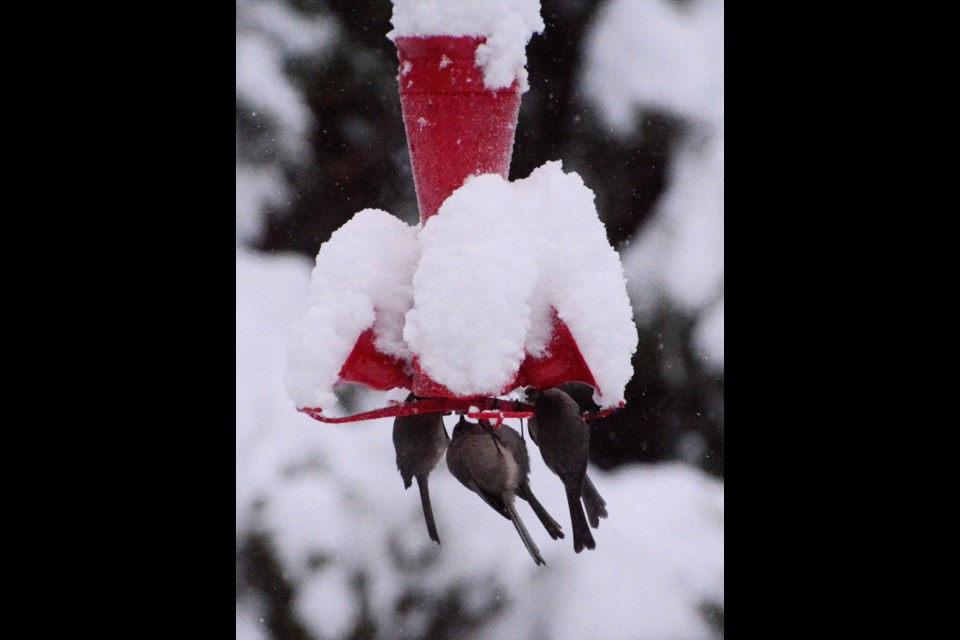Heavy snow and an extended period of cold weather is making it hard for Anna’s hummingbirds to find food, expert birder Ann Nightingale said Tuesday.
Snow for a day of two is not a problem for these small colourful birds, said the Rocky Point Bird Observatory board member.
“They’re pretty stoic and can work their way around for a couple of cold days. But some birds, not just hummingbirds, are starting to have trouble finding food,” said Nightingale.
Varied thrushes are also having a difficult time in the snow and cold, said Nightingale. Like hummingbirds, they normally eat insects.
A simple way to help the birds is to keep hummingbird feeders up and increase the sugar content of the feeding solution, said Nightingale.
“The normal is one-part sugar to four-parts water. It’s safe to go one-part sugar to three-parts water. It won’t freeze quite as quickly.”
Alison Moran, co-ordinator of the observatory’s hummingbird project, cautions against making the solution any stronger.
“It’s OK for a limited period to go to one-part sugar and three-parts water to reduce the freezing, but don’t go any stronger because it creates real problems because they’ll become dehydrated. When it’s freezing, there isn’t a lot of water.”
Moran said there is all sorts of idiocy on the Internet about adding salts and proteins. “It’s kind of a nightmare. Add nothing. Just water and sugar,” Moran said.
Brown sugar will give hummingbirds iron poisoning. Honey is the wrong kind of sugar and fruit juice is bad as well, she said.
“The cleanest thing you can give them is plain white sugar, and those mixes are a waste of money and they could be a problem,” said Moran.
Anna’s hummingbirds breed all year, but the bulk of the breeding is this winter period going into early spring, said Moran.
“We saw mating displays at the beginning of December and we usually see a real burst of juveniles right now. Honestly, probably a lot of the babies in the first clutch won’t make it because the parents will be on a pretty strict energy budget right now,” said Moran. “I would have expected to see fledgling around this week.”
Another good strategy is to have multiple feeders, said Nightingale. As soon as one starts to freeze, bring it inside and put another one outside and alternate them.
People can also warm hummingbird feeders by hanging them next to a porch light or by wrapping them in Christmas lights. It’s also a good idea to put a cover over the feeder to protect it from the snow.
“People have been quite creative. They’ve been using hand warmers and putting them on the hummingbird feeders with a sock over it. Others have placed bubblewrap or foam around the feeder to stop the liquid from freezing,” Nightingale said.
Although she hasn’t heard of any birds dying, Nightingale has seen Facebook posts of birds in trouble. “It’s really important for people to understand that even if a hummingbird appears to be dead, it may not be dead,” she said. “Hummingbirds go into torpor, almost like hibernation. Every night they shut down. Their heart beat slows. Their temperature drops. So if you find one on the ground underneath the feeder, there’s a chance it may not be dead.”
The bird can be placed in a box with a feeder so if it does revive, it will have a source of food, Nightingale said. “Once it’s up and active again, let it out once it’s daytime.”
People can take birds in distress to Wild Arc, the B.C. SPCA Wild Animal Rehabilitation Centre or the Central Veterinary Hospital on Roderick Street, which does intake for Wild Arc.
Nightingale has scattered bird seed in her carport and opened the door to her greenhouse so birds can shelter out of the snow.
Varied thrushes also eat fruit, so putting out an apple can really help them, said Nightingale.
“If the snow is going to be on the ground for another week, that’s a long time for birds to be struggling to find food.”
She recommends people with bird feeders fill them with suet and black oil sunflower seeds. These foods have lots of good protein and oil, she said.



